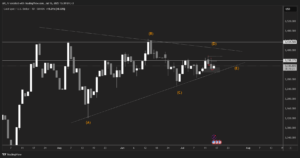Inflation fears continue to rise in Europe as Russia announces a 3-day halt to gas supplies along Nord Stream 1.
· UK inflation fears rise as workers at the UK’s largest container port strike
· AUD/USD rises after PBoC cuts its benchmark lending rate
· Oil falls as an Iran nuclear deal could be imminent
European and US markets came under pressure last week after a four-week rally. The DAX fell 1.8% across the week, dragged lower by rising inflation, the ongoing energy crisis, and fears of an imminent recession. Meanwhile, the S&P 500 fell 1.2%, retreating from a three-month high on concerns that the Federal Reserve will continue to raise interest rates aggressively, hitting economic growth.
The FTSE managed to finish the week higher, thanks partly to the weaker pound, which tanked 2.5% against the USD as inflation hit double digits for the first time in 40 years, intensifying the cost of living crisis. Given that the FTSE is more exposed to China through its heavy-weighted resource stocks, the index could struggle to extend gains much beyond last week’s high of 7578 as fears over China’s growth mount.
Gas supply cut
Today stock indices across the board are heading lower. Russia announced that it would halt gas supply to Europe along the Nord Stream 1 pipeline for three days at the end of the month, exacerbating the energy crisis. Gas prices in Europe are nearing a 5-month high. The announcement comes after the German PPI jumped by 5.3% last week in a record move.
UK strikes
Meanwhile, the announcement of an 8-day strike at the UK’s largest port, Felixstowe, is also unnerving investors, hurting the market mood. The strike over pay could result in trade and supply chain issues and raise inflation.
The FTSE is set to start the week -0.23% lower, and the DAX points to a 0.5% fall on the open.
While there is little in the way of high impacting economic data today, inflation and the Fed will remain a key focus, with the Jackson Hole Symposium and US PCE inflation due later in the week.
AUD/USD
AUD/USD was one of the worst performing pairs last week, dropping over 3% on rising concerns over the health of the Chinese economy and after weaker than expected Australian labour market data. Today the Aussie is outperforming its peers, pushing higher against the USD after the PBoC cut the Loan Prime Rate, its benchmark lending rate, and lowered its mortgage reference by a larger margin in an attempt to revive growth in the faltering economy. AUD/USD trades 0.2% higher at the start of the week, rebounding to 0.69.
Oil
Oil prices are heading lower on Monday after three days of gains on reports that Iran and Western nations are close to striking a nuclear deal that would lift sanctions on Iranian oil, boosting supply to the market. This is not the first time the market has gotten excited over the prospect of a deal. However, reports that Iran has softened its position are helping fuel expectations. Prices are also falling over concerns of slowing demand in China, the world’s largest oil importer, due to a power crunch in the country’s southwest caused by a heatwave. The province of Sichuan will extend restrictions on industrial power users until Thursday, a move that could impact economic activity.
Disclaimer: This article is not investment advice or an investment recommendation and should not be considered as such. The information above is not an invitation to trade and it does not guarantee or predict future performance. The investor is solely responsible for the risk of their decisions. The analysis and commentary presented do not include any consideration of your personal investment objectives, financial circumstances, or needs.





